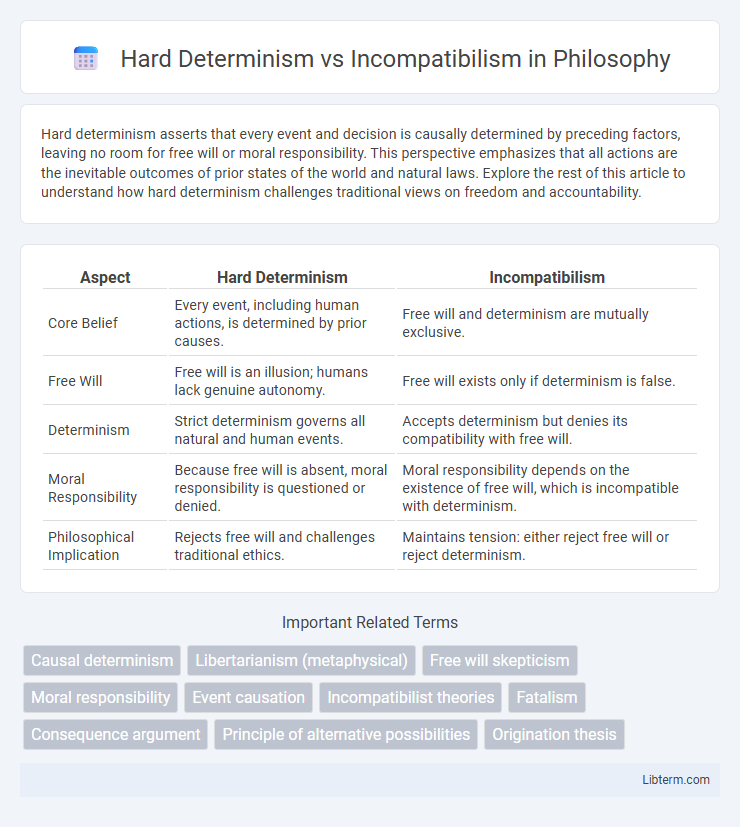Hard determinism asserts that every event and decision is causally determined by preceding factors, leaving no room for free will or moral responsibility. This perspective emphasizes that all actions are the inevitable outcomes of prior states of the world and natural laws. Explore the rest of this article to understand how hard determinism challenges traditional views on freedom and accountability.
Table of Comparison
| Aspect | Hard Determinism | Incompatibilism |
|---|---|---|
| Core Belief | Every event, including human actions, is determined by prior causes. | Free will and determinism are mutually exclusive. |
| Free Will | Free will is an illusion; humans lack genuine autonomy. | Free will exists only if determinism is false. |
| Determinism | Strict determinism governs all natural and human events. | Accepts determinism but denies its compatibility with free will. |
| Moral Responsibility | Because free will is absent, moral responsibility is questioned or denied. | Moral responsibility depends on the existence of free will, which is incompatible with determinism. |
| Philosophical Implication | Rejects free will and challenges traditional ethics. | Maintains tension: either reject free will or reject determinism. |
Introduction to Hard Determinism and Incompatibilism
Hard determinism asserts that every event, including human actions, is determined by prior causes, negating free will and moral responsibility. Incompatibilism maintains that free will and determinism cannot coexist, positing either determinism is true and free will is an illusion, or free will exists and determinism is false. Both philosophies challenge traditional notions of autonomy by emphasizing a deterministic universe incompatible with genuine human freedom.
Defining Hard Determinism
Hard determinism asserts that every event, including human actions, is determined by preceding causes, negating the existence of free will. This philosophical stance holds that moral responsibility is an illusion since choices are inevitably dictated by deterministic laws. By rejecting the compatibility of free will with determinism, hard determinism aligns closely with incompatibilism, which maintains that free will cannot coexist with a predetermined universe.
Understanding Incompatibilism
Incompatibilism holds that free will and determinism cannot coexist, asserting that if every event is determined by prior causes, genuine free will is impossible. Hard determinism is a specific form of incompatibilism that denies free will altogether, emphasizing a causally determined universe where all actions are preordained. Understanding incompatibilism involves recognizing the philosophical stance that moral responsibility requires the freedom to have acted otherwise, which determinism negates.
Core Differences Between Hard Determinism and Incompatibilism
Hard Determinism asserts that every event, including human actions, is causally determined by preceding events, denying free will entirely. Incompatibilism is a broader philosophical stance stating that free will and determinism cannot coexist, encompassing both hard determinism and libertarianism. While hard determinism strictly denies free will due to causal determinism, incompatibilism highlights the logical conflict between free will and determinism without committing to a specific stance on which is false.
Philosophical Foundations and Historical Development
Hard Determinism posits that every event is causally determined, leaving no room for free will, grounded in the mechanistic worldview of the 17th and 18th centuries, notably influenced by thinkers like Thomas Hobbes and Baruch Spinoza. Incompatibilism asserts that free will and determinism cannot coexist, a stance deeply rooted in Immanuel Kant's argument on moral responsibility and further developed through 20th-century analytic philosophy by philosophers such as Peter van Inwagen. The historical development reflects a shift from classical determinist paradigms to sophisticated analyses of moral agency and metaphysical freedom, highlighting ongoing debates in metaphysics and ethics.
Key Arguments for Hard Determinism
Hard determinism asserts that every event, including human actions, is the inevitable result of preceding causes, rejecting the existence of free will. Key arguments for hard determinism emphasize causal determinism, asserting that natural laws govern all events and human behavior, making freedom an illusion. Proponents argue that moral responsibility is incompatible with determinism because individuals cannot be held accountable for actions predetermined by factors beyond their control.
Major Critiques of Incompatibilism
Incompatibilism faces major critiques regarding its strict separation of free will and determinism, often accused of disregarding nuanced human agency under causal laws. Critics argue incompatibilism oversimplifies moral responsibility by denying freedom in deterministic frameworks despite evidence of complex decision-making processes in neuroscience and psychology. This stance challenges the practicality of legal and ethical systems that rely on some form of compatibilist free will for accountability.
Implications for Free Will and Moral Responsibility
Hard Determinism asserts that every event, including human actions, is determined by prior causes, negating the existence of free will and thereby challenging the basis for moral responsibility. Incompatibilism holds that free will and determinism cannot coexist, implying that if determinism is true, individuals cannot be held morally accountable for their actions. Both perspectives fundamentally question traditional notions of autonomy and ethical responsibility by denying true freedom in decision-making processes.
Contemporary Debates and Perspectives
Hard determinism asserts that all events, including human actions, are causally determined by preceding events, negating free will and moral responsibility, a view upheld by contemporary philosophers like Derk Pereboom. Incompatibilism, which includes both hard determinism and libertarianism, argues that free will cannot coexist with determinism, sparking debates over the nature of agency and ethical accountability in contexts such as neuroscience and quantum mechanics. Recent discussions emphasize empirical findings and conceptual analysis to evaluate if deterministic frameworks necessarily preclude autonomy and moral responsibility in human behavior.
Conclusion: Evaluating the Debate
Hard Determinism asserts that free will is an illusion due to the causal necessity of events, leading to a deterministic worldview where moral responsibility is undermined. Incompatibilism holds that free will and determinism cannot coexist, emphasizing that if determinism is true, genuine moral accountability is impossible. Evaluating the debate highlights fundamental tensions in metaphysics and ethics, influencing contemporary discussions on human agency and legal responsibility.
Hard Determinism Infographic

 libterm.com
libterm.com